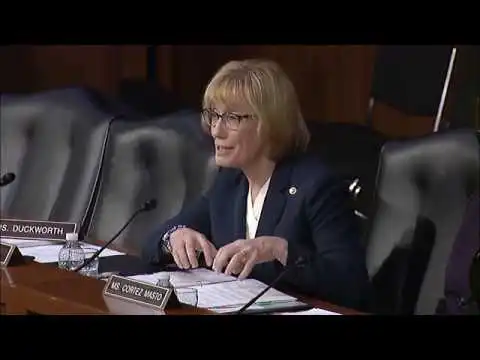The loot box issue is still being debated and today US Senator Maggie Hassan pressed the ESRB to take action against predatory practices.
During the Senate Commerce, Science and Transportation Committee hearing, Hassan probed potential FTC members on the dangers of lot boxes and also issued a letter to the ESRB President Patricia Vance. The letter read:
Patricia Vance
President
Entertainment Software Ratings BoardDear Ms. Vance:
I write to today regarding an important gaming issue that was recently brought to my attention by a constituent.The Entertainment Software Ratings Board (ESRB) has an important mission in both providing parents with the necessary information to make decisions about the suitability of games, and their content, for children, as well as ensuring that the industry is following responsible marketing practices.
The ESRB rating system is of great value to parents across the country, empowering parents to make informed decisions on behalf of their children. As technology advances, ESRB must work to keep pace with new gaming trends, including the in-game micro-transactions and predatory gaming tactics, particularly as they are deployed on minors.
The prevalence of in-game micro-transactions, often referred to as ‘loot boxes,’ raises several concerns surrounding the use of psychological principles and enticing mechanics that closely mirror those often found in casinos and games of chance. The potential for harm is real. Recently the World Health Organization classified “gaming disorder” as a unique condition in its recent draft revision of the 11th International Classification of Diseases. While there is robust debate over whether loot boxes should be considered gambling, the fact that they are both expensive habits and use similar psychological principles suggest loot boxes should be treated with extra scrutiny. At minimum, the rating system should denote when loot boxes are utilized in physical copies of electronic games.
To that end, I respectfully urge the ESRB to review the completeness of the board’s ratings process and policies as they relate to loot boxes, and to take into account the potential harm these types of micro-transactions may have on children. I also urge the board to examine whether the design and marketing approach to loot boxes in games geared toward children is being conducted in an ethical and transparent way that adequately protects the developing minds of young children from predatory practices.
Further, I urge the ESRB to consider working with the relevant stakeholders – including parents – to collect and publish data on how developers are using loot boxes, how widespread their use is, and how much money players spend on them.
Finally, I ask that you develop best practices for developers, such as ethical design, tools for parents to disable these mechanisms, or making them less essential to core gameplay.
A video of the Senate hearing can be seen below and it looks like things are hotting up as far as regulation is concerned and that may now involve the FTC if the ESRB continues to dig their heels in on the issue.
Update: The ESRB issued the following statement in reply:
“We received Senator Hassan’s letter and appreciate her confidence in and support of the ESRB rating system. For more than two decades we have earned the trust of parents around the country by helping them make informed decisions about the games their children play. As the industry evolves, so does our rating system, and we will continue to make enhancements to ensure parents continue to be well-informed. We will also continue to provide information about additional tools, including parental control guides, that help parents set spending and time limits and block potentially inappropriate games based on the ESRB-assigned age rating.”
Thanks RollingStone.







Published: Feb 15, 2018 05:19 am